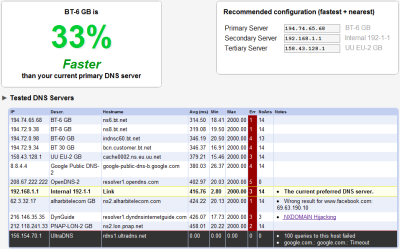

- #GOOGLE NAMEBENCH HOW TO#
- #GOOGLE NAMEBENCH INSTALL#
- #GOOGLE NAMEBENCH MANUAL#
- #GOOGLE NAMEBENCH SOFTWARE#
- #GOOGLE NAMEBENCH CODE#
To compare DNS servers, namebench performs DNS lookup on hostnames found in your web browser history, or Alexa top 10,000 domain names. Sample DNS Speed Test Results by namebench DNS Speed Comparison Summary: Mean/Minimum DNS Response Time: DNS Response Time Distribution: A typical DNS benchmarking report generated by namebench looks like the following. When run in GUI mode, namebench will show DNS speed test result in a web browser window. Saving detailed results to /tmp/namebench_2337.csv Saving report to /tmp/namebench_2337.html Recommended configuration (fastest + nearest): When run in command-line mode, namebench will, upon completion, prints out benchmarking summary (e.g., recommended DNS configuration) in the terminal as follows. namebench will test your local DNS servers, as well as public and regional DNS servers. Click on Start Benchmark button to start DNS benchmarking. If you running namebench in a Linux desktop environment, namebench will launch a graphical interface as follows. If you don't have X11 installed, namebench will automatically proceed in command-line mode, and start evaluating available DNS servers right away.
#GOOGLE NAMEBENCH INSTALL#
To install and launch namebench on CentOS, RHEL or Fedora: $ sudo yum install tkinter To install and launch namebench on Debian, Ubuntu or Linux Mint: $ sudo apt-get install python-tk
#GOOGLE NAMEBENCH HOW TO#
In this post, I will describe how to test and compare DNS server speed by using namebench. namebench can run in command-line mode as well as in GUI mode. On Linux, there is an open-source DNS benchmark tool called namebench which can help you find the best DNS servers to use. Before switching to different DNS servers, you probably want to compare DNS server speed among available DNS servers, and find the best DNS for you. If you are not satisfied with the default DNS service, you can consider using other public DNS services such as Google DNS, OpenDNS, etc.
#GOOGLE NAMEBENCH MANUAL#
Reimplement functions that were planned, but did not work with namebench 1.3.Without manual configuration, your Linux will be set to use the DNS service offered by your ISP or organization.
#GOOGLE NAMEBENCH SOFTWARE#
Prerequisite: the system running this software must have the tool "nslookup" installed. The 'master' branch is currently in experimental form and currently lacks a user interface, nor does it support any command-line options. WARNING: This tool is in the midst of a major rewrite.
#GOOGLE NAMEBENCH CODE#
While it seems that the initial Author wanted to move the application towards GO with another application use - I just wanted to continue and maintain the python variant as it did what it should.Īfter investigation the python code showed up some very frustrating complications, which were leading to my decision to reimplement the initial application idea - also in GO. namebench provides personalized DNS server recommendations based on your browsing history. This project has been forked from google/namebench.

NAMEinator runs on Windows (10), Linux (tested on Ubuntu 16.04) and is available with aĪ command-line interface and in the near future with a graphical user interface. This project began as a 20% project at Google. NAMEinator is completelyįree and does not modify your system in any way. NAMEinator runs a fair and thorough benchmark using standardizedĭatasets in order to provide an individualized recommendation. It hunts down the fastest DNS servers available for yourĬomputer to use. Are you a power-user with 5 minutes to spare? Do you want a faster internet experience?


 0 kommentar(er)
0 kommentar(er)
